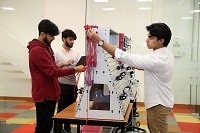 Three computer science students at Canadian University Dubai have created a smart bin to cut food waste by converting more of it into biogas, a source of renewable energy.
Three computer science students at Canadian University Dubai have created a smart bin to cut food waste by converting more of it into biogas, a source of renewable energy.
According to The National News, the Digi-Bin was invented by Zahab Khan, 19, Prateek Mishra, 20, and Denver Dias, 19, all from India, to incentivise recycling by helping people to reduce their electricity bills.
The bin’s contents would be taken to a biogas plant to be turned into biofuel.
In theory, users of the bins would be rewarded with carbon credits, which could be coupons for savings on their electricity bills.
A solution for a growing problem
Mr Khan, a second-year computer science student at Canadian University Dubai who worked on Digi-Bin, said the idea came about when the three friends took part in a competition called Future Disruptors.
They were searching for problems to tackle and came across an article that said the UAE wastes about $6 billion of food every year.
“We wanted to create something that would help tackle this, and something that everyone in the UAE could contribute to,” Mr Khan said.
“What we wished to do was to encourage people to segregate their waste, which is good for the environment. At the same time, we would act as facilitators and help collect this food waste.”
The team came up with the concept of the bin to support the UAE’s national sustainable consumption initiative, which aims to halve food waste by 2030.
Recent estimates indicate that the average per capita food waste in the UAE is 2.7 kilos per day, UN officials said at an event in September.
Authorities in the Emirates reported in 2020 that the problem costs the country Dh13bn a year.
“At the moment we’re still relying on user-segregation of waste, so we would like to build in artificial intelligence to make the process easier,” Mr Khan said.
“We also hope to see a growth in the number of facilities that can convert the waste into fuel, to help the innovation reach its potential in re-using food waste in a sustainable way.”
How it works
Mr Dias, a second-year computer science student at the university, explained the technology behind the bin.
He said when discarding food waste into the Digi-Bin, users would scan their phone to receive recognition that they had segregated the waste rather than disposing it into a general waste bin. After doing this enough times, the user would be rewarded with credit.
The bin uses sensors to weigh the food waste and then relays the information to the smart app. The weight of the food thrown away can be calculated and displayed by the app.
A filled Digi-Bin would then be sent to a facility to be converted into biofuel and any food waste that was not suitable for this process would be segregated to produce fertiliser.
The initiative would also cut down on costs segregating food waste from other recycling after it has been disposed of.
“Ultimately, we hope that the Digi-Bin can contribute to one of the main goals of the national Ne’ma initiative, to mobilise individuals and local communities to take collective action,” Mr Dias said.
“By promoting new, positive behaviour, we can help contribute to the UN SDG [Sustainable Development Goal] target of reducing food loss and waste by 50 per cent by 2030.”
Next steps
The aim is for the Digi-Bin to be place not only in homes but also in malls and restaurants.
The team were one of a handful selected to showcase their prototype at the Future Disruptors Zone during Gitex this year.
Mr Mishra, a third-year computer science student, said the Digi-Bin would ideally reward users through a loyalty programme. But he admitted that the team did not have the experience to make it happen.
“What we came to realise was, we’re all second and third year students in a computer science course,” he said. “What we lack is the knowledge to take it forward. After we graduate, we want to work on the discipline further and take it to market.”
In the meantime, they are working on improving the technology and building the professional networks that will help take their innovation forward. (NewsWire)
